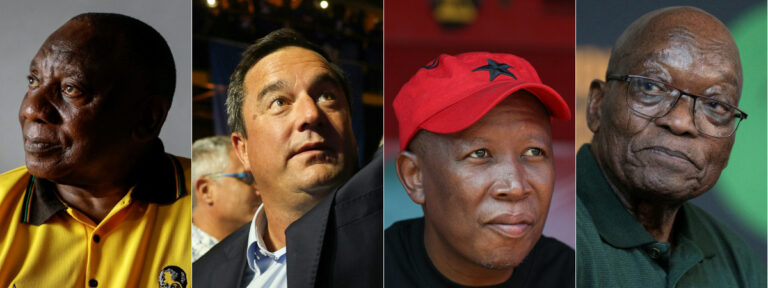South Africa’s ruling African National Congress (ANC) reportedly continues to reach out to rivals to form a government of national unity, after failing to win an outright majority in late May’s general election.
Bookmark The South African website’s Elections 2024 hub for the latest news you need to know
The final ANC tally gave President Cyril Ramaphosa’s party just 159 members in the 400-seat National Assembly, its lowest number ever in a general election.
Some sort of coalition will now need to be formed to govern the country for the next five years.
What coalition would YOU like to see in place? Here are some possible options …
A – ANC/DA/IFP – 263 seats
B – ANC/MK/EFF – 256 seats
C – ANC/DA – 246 seats
D – ANC/MK – 217 seats
E – ANC/EFF – 198 seats + smaller parties
F – Other
Let us know by clicking on the comment tab below this article or by emailing info@thesouthafrican.com or sending a WhatsApp to 060 011 021 1
You can also follow @TheSAnews on X and The South African on Facebook for the latest 2024 election news.
At the time of publishing, indications are that a Government of National Unity (GNU) between the ANC-DA-IFP will be formed.
It certainly won’t please everyone, but many will argue it ‘could be far worse’.
As reported by The South African website, the 400 MPs will be sworn in on Friday, 14 June from 10:00.
Click HERE to view the full list.
Seat allocation
The ANC saw their number of seats plummet from 230 to 159, below the ‘magical’ 201 mark which would’ve seen it retain sole power.
The Democratic Alliance (DA) improved from 84 seats in 2019 to 87 this time around.
Jacob Zuma’s uMkhonto weSizwe (MK) party were the big winners, going from obscurity to 58 seats, while the Economic Freedom Fighters (EFF) dropped from 44 to 39.
The Inkatha Freedom Party (IFP) also improved from 14 to 17 seats.
In total, 18 parties won seats in 2024 which was up from the 14 parties which did so in 2019.
| Rank | Party | Regional | National | Seats |
| 1 | ANC | 86 | 73 | 159 |
| 2 | DA | 45 | 42 | 87 |
| 3 | MK party | 27 | 31 | 58 |
| 4 | EFF | 22 | 17 | 39 |
| 5 | IFP | 9 | 8 | 17 |
| 6 | PA | 4 | 5 | 9 |
| 7 | VF PLUS | 2 | 4 | 6 |
| 8 | ActionSA | 2 | 4 | 6 |
| 9 | ACDP | 0 | 3 | 3 |
| 10 | UDM | 1 | 2 | 3 |
| 11 | ATM | 0 | 2 | 2 |
| 12 | ALJAMA | 0 | 2 | 2 |
| 13 | BOSA | 0 | 2 | 2 |
| 14 | NCC | 1 | 1 | 2 |
| 15 | RISE | 1 | 1 | 2 |
| 16 | GOOD | 0 | 1 | 1 |
| 17 | PAC | 0 | 1 | 1 |
| 18 | UAT | 0 | 1 | 1 |
| TOTAL | 200 | 200 | 400 |
ANC spokeswoman Mahlengi Bhengu-Motsiri told reporters the party held “explorative” talks with several others, as it attempts to secure enough parliamentary support to form a government and elect a president.
Its decision making body met to vet all options, including trying to form a minority government, she said.
Among those consulted were parties with radically different agendas, such as the centre-right Democratic Alliance, the leftist Economic Freedom Fighters (EFF) and the Zulu nationalist Inkatha Freedom Party (IFP).
No response from MK party
The ANC also “repeatedly” reached out to former president Jacob Zuma’s uMkhonto weSizwe (MK) party, which won a surprising 14.6 percent of the vote, but was snubbed, receiving no response.
MK has rejected the election results and threatened to boycott parliament.
It has also said it would not back an ANC-led government if Ramaphosa remains at the helm. The president’s party plans to keep him.
The briefing followed a meeting of the ANC’s top leaders, set to chart a way forward for the party after its poor showing at the ballot.
The ANC won 40 percent – a catastrophic slump from the 57.5 percent it garnered in 2019.
Additional reporting from AFP

